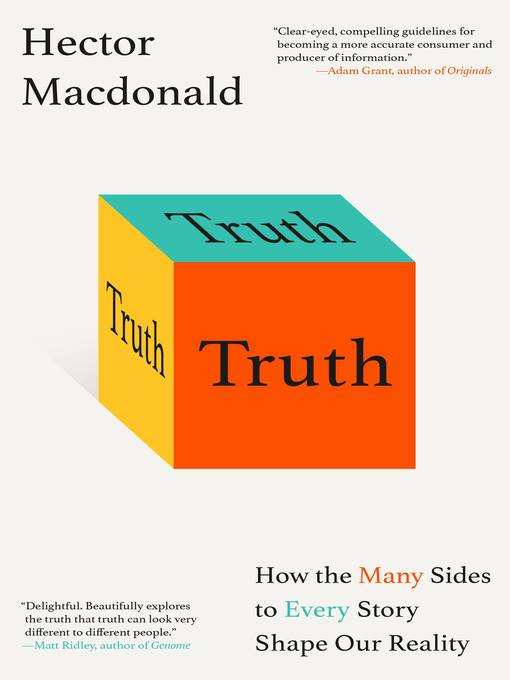
Truth
How the Many Sides to Every Story Shape Our Reality
کتاب های مرتبط
- اطلاعات
- نقد و بررسی
- دیدگاه کاربران
نقد و بررسی

January 29, 2018
Novelist and communications consultant Macdonald (Rogue Elements) encourages his audience to “spot and neutralize the misleading truths”—in short, to think critically. A kernel of factuality is, he writes, what makes “competing truths”—the “many sides” to a story—so powerful and dangerous. The book contains a number of useful tools, such as a set of descriptions for various communicators (advocates, misinformers, and misleaders). Whether the example involves distinguishing between famous paintings and their forgeries or conditioning soldiers to kill by euphemistically reframing combat as “engaging” or “dropping” the enemy, Macdonald shows how slippery the truth can be and how context, values, and definitions have to be factored in when determining the truth of a statement. The text is peppered with thought experiments and citations of research studies, and each chapter concludes with insightful tips, such as asking oneself, “If your audience knew everything you know about your subject, would they think you had portrayed it fairly?” Macdonald declares that he is not interested in “lies, alternative facts, conspiracy theories, fake news,” but his book is undoubtedly more relevant because of its relationships to these timely topics. Although not groundbreaking, this is a useful, commonsensical framework for making reasonable, responsible, and effective decisions. Agent: Richard Pine, InkWell Management Literary.

February 1, 2018
How can I mislead you? Let me count the ways.Macdonald (The Hummingbird Saint, 2016, etc.), described as an "expert in business storytelling," opens with an instructive look at one of the avenues by which dubious information becomes enshrined as fact--namely, good intentions. His case study is the lowly Andean grain called quinoa, discovered a couple of decades ago by health-conscious eaters and celebrated as a superfood. So popular was it that quinoa prices tripled in South America, followed by "rumors that local people could no longer afford to eat their traditional food because of the insatiable demand from North America and Europe." Yes, but the unstated part of the equation was that this demand brought enough money into the economy that Bolivian farmers could eat something more expensive. Chalk up a "partial truth," then, which may or may not be sufficient to explain why something is the way it is, even when ventured for "the noblest of reasons." Usefully, Macdonald examines not only partial truths--incomplete for reasons ranging from good aims to obfuscation--but also other categories of "competing truths," among them subjective and unknown truths, as well as truths that are not strictly factually provable but are so because we act on them as if they were. In the end, no matter what category our various mendacities and half-baked notions fall into, one is impressed by how much activity centers on them. In a particularly pointed example, the author examines the use of the word "natural" when applied to a fizzy drink in which cane sugar took the place of the former corn syrup and the regulatory quandaries thereby exposed, eventually causing the company to drop the term. "You know your marketers have lost touch with reality," Macdonald writes, "when they need 'detailed regulatory guidance' on how to use a word like natural."Nothing earthshakingly new here, but an interesting and entertaining excursus that, in this post-truth era, may prove of use in helping unpack a specious claim or two.
COPYRIGHT(2018) Kirkus Reviews, ALL RIGHTS RESERVED.

March 15, 2018
Novelist Macdonald (Rogue Elements) applies his storytelling and communications expertise to this relevant analysis of truth. The author defines truth as based on fact and incorporating subjective judgments not known to be untrue. His focus is not on the lies, conspiracy theories, fake news, etc., in today's posttruth era, but on the misleaders who hide behind the First Amendment and cover up the truth. He emphasizes that truth is what we believe it to be, and that beliefs can easily be manipulated. Rather than a philosophical discussion about the concepts at hand, Macdonald targets those who are tired of being lied to by politicians, marketers who selectively use connections to influence commerce, leaders desiring a better way of inspiring their organizations, and those seeking the most ethical truth. This important, timely work includes a list of organizations that studiously fact check and analyze misinformation, nicely complementing Kevin Young's Bunk, Jennifer Wilson's Critical Thinking, Ori Brafman and Rom Brafman's Sway, or Rolf Dobelli's The Art of Thinking Clearly. VERDICT Essential for all economics, political science, and pop culture collections.--Dale Farris, Groves, TX
Copyright 2018 Library Journal, LLC Used with permission.

























دیدگاه کاربران